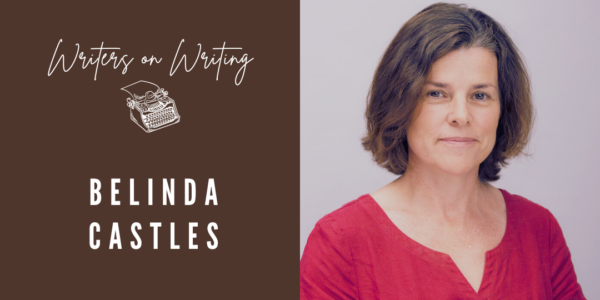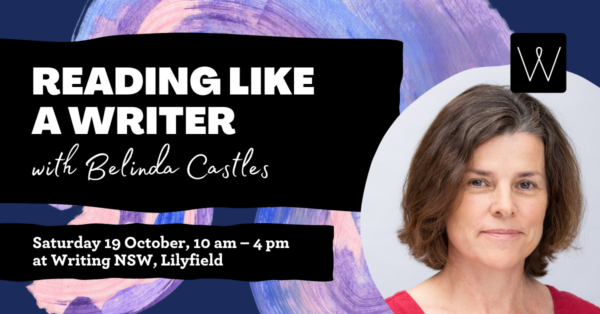
Writers on Writing is our regular conversation with a writer or industry professional about the writing craft, industry insights, and their own practice. This week, we spoke to award-winning author Belinda Castles about the importance of reading with intent, ahead of her workshop Reading Like a Writer.
Were you always a big reader? Which books have had the biggest influence on you?
I was a compulsive and undiscriminating reader as a child. I read whatever was to hand at a given moment: books, comics, the back of a cereal packet. I would often pick up books I’d read many times and read them again. Rereading is an important mode of reading – taking in patterns until they become part of the fabric of your thoughts, learning how language and story and people’s minds work. I also read whatever the adults might have taken on holiday, not having thought to pack books myself. That’s how I first read The Catcher in the Rye and it felt like a discovery to chance upon something like that, beyond my knowledge and experience of the world and written in a way I hadn’t seen before, according to the rhythms of speech. When I read as a young person I went about thinking in the language and patterns of those books for a time afterwards. As well, no one was checking my reading was age-appropriate so I was learning all sorts of things about the world every time I picked up a book. I think that freedom is important and instructive (and made reading books addictive in a time without the internet).
In your edited essay collection, Reading Like an Australian Writer, exceptional Australian writers reflect on their reading of other exceptional Australian writers. It must have been a joy to edit. Was there anything that surprised you in their responses to these works?
It was a delightful book to edit, partly because the thing I like most about talking to writers is swapping reading tips and sharing appreciation for the books that excite us, and then puzzling over how they work their magic. I asked writers: What Australian writer’s work teaches you something about writing? How does a writer read? What are you looking for? What does it give you? I learned so much from their answers. A few treasures: use energetic verbs (Tegan Bennett Daylight on Helen Garner); write with your body (Nigel Featherstone on Christos Tsiolkas; writing comes from a shared repository of stories (Maria Takolander on Carrie Tiffany); a novel can do anything (Nicholas Jose on JM Coetzee); kinship brings writing to life (Ellen van Neerven on Tara June Winch) and so very much more.
In what ways are Australian fiction writers and writing distinctive from their overseas counterparts?
Australia has its own history, atmospheres and distinctive forms of English. What gives its writing energy comes from the country itself, its textures, seasons, gifts and dangers, but also its humour. And Australian fiction has been energised immeasurably by its sheer variety. Some of our writers are part of the oldest storytelling traditions on earth; some, like me, arrived as adults, and bring memories of other places into their story worlds. The whole world is here, often viewed with an appealing earthiness and expressed via an array of linguistic influences.
In your course, students learn how to use their reading practice to fuel and hone their writing. Have there been any moments you remember when reading sparked a major writing inspiration for you?
Philip Pullman has said that he has stolen from every book he ever read and I believe that’s true of all of us. Your reading works its way into the textures of your thinking and worldview, so you should take in plenty of good stuff! The Canadian short story writer Alice Munro makes me stop and marvel every time I read (and reread) her stories. She reminds me that attention is everything, that small moments can be monumental, that ordinary people’s lives matter. She hears the place she is in through speech and ways of thinking. She must have led the most fascinating life, so attuned to people in their world, and she makes me want to bring that quality of attention to my life and writing.
Why is being a reader so important to being a writer?
It is a pleasurable, largely unconscious training ground in which you develop your sense of storytelling language and form. Like musicians, writers need to know how the form works and what it’s capable of doing. And it’s only when you know what’s already been done that you can see where you might make something new…
Belinda Castles is the author of four novels and winner of the Australian/Vogel’s and Asher literary awards, as well as being named one of the Sydney Morning Herald’s Best Young Novelists. Her most recent novel, Bluebottle, was long-listed for the Stella Prize. She is the editor of the collection Reading like an Australian Writer and is working on a fifth novel and a book about walks with writers in Sydney. She has taught writing in Australia and the UK and is currently a lecturer in creative writing at the University of Sydney.
Enrol in Reading Like a Writer with Belinda Castles on Saturday 19 October 2024, 10 am – 4 pm.
If you want to be the first to read great advice, prompts and inspiration from our incredible tutors, subscribe to our weekly e-newsletter Newsbite.
More from Writing NSW
Check out our full range of writing courses in Sydney, our online writing courses and our feedback programs to see how we can help you on your creative writing journey. Find out about our competitions & opportunities, as well as writing groups across NSW, and sign up to our weekly newsletter for writing events, opportunities and giveaways.

